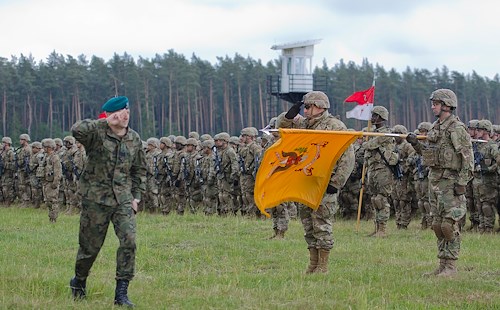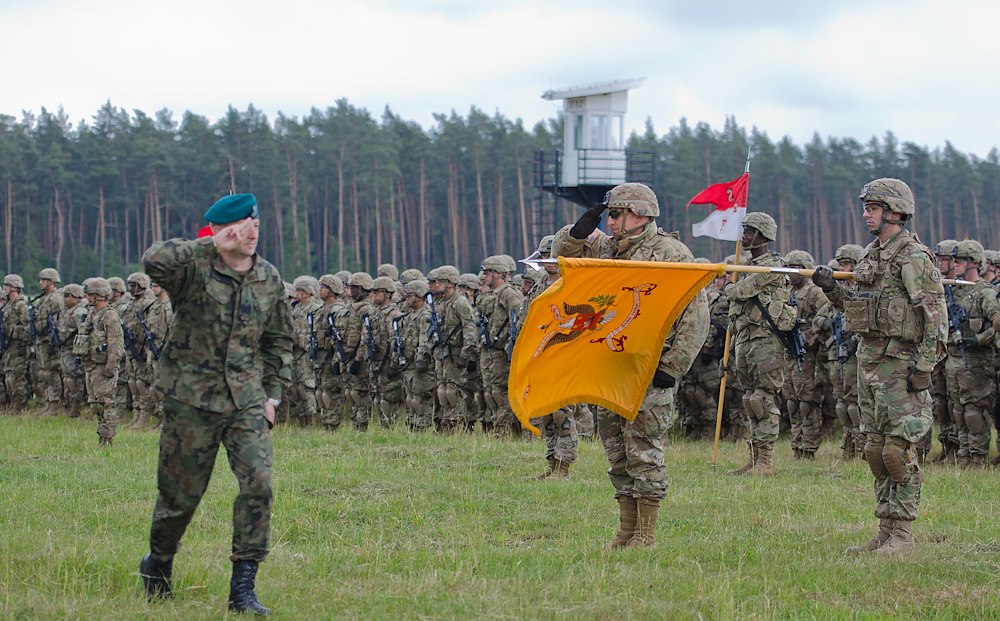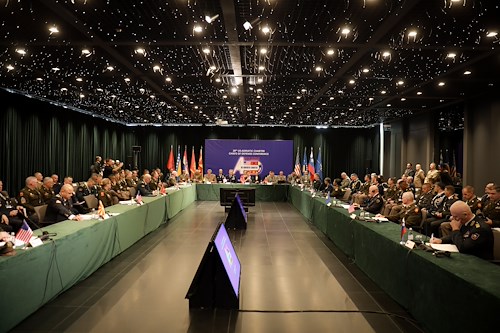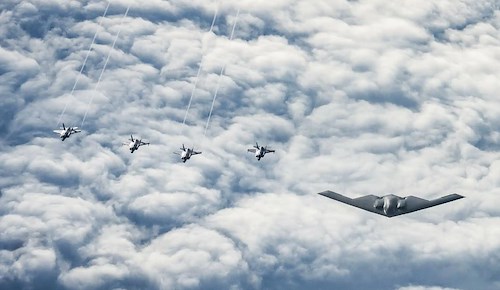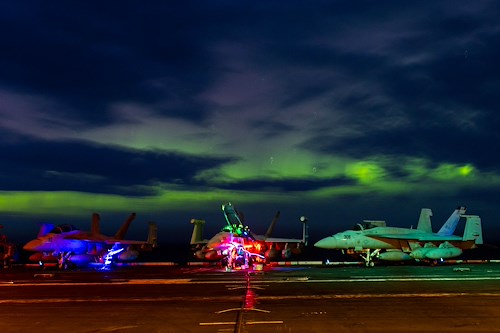Gallery contains 5 images
×
Photo 1 of 5
Multinational Battle Group kicks off Saber Strike 17 in Poland
Polish Brig. Gen. Jaroslaw Gromadziński, Commander, 15th Mechanized Brigade, and Lt. Col. Steven Gventer, commander of enhanced Forward Presence Battle Group Poland, both render salutes as Brig. Gen. Gromadziński inspects the troops during the official opening ceremony of Saber Strike 17 at Land Forces Field Training Center June 5, 2017. Exercise Saber Strike facilitates cooperation and improves joint operational capability in a variety of missions and prepares the participating nations and units for future operations while enhancing the NATO Alliance. (U.S. Army photo by Sgt. Justin Geiger)
Photo by: Sgt. Justin Geiger
Photo 2 of 5
Multinational Battle Group kicks off Saber Strike 17 in Poland
Polish Soldiers patiently wait to raise Poland’s National flag before the official opening ceremony of Saber Strike 17 at Land Forces Field Training Center June 5, 2017. Exercise
Saber Strike facilitates cooperation and improves joint operational capability in a variety of missions and prepares the participating nations and units for future operations while enhancing the NATO Alliance. (U.S. Army photo by Sgt. Justin Geiger)
Photo by: Sgt. Justin Geiger
Photo 3 of 5
Multinational Battle Group kicks off Saber Strike 17 in Poland
Lt. Col. Steven Gventer, commander of enhanced Forward Presence Battle Group Poland, stands in front of the battle group formation during the official opening ceremony of Saber Strike 17 at Land Forces Field Training Center June 5, 2017. Exercise Saber Strike facilitates cooperation and improves joint operational capability in a variety of missions and prepares the participating nations and units for future operations while enhancing the NATO Alliance. (U.S. Army photo by Sgt. Justin Geiger)
Photo by: Sgt. Justin Geiger
Photo 4 of 5
Multinational Battle Group kicks off Saber Strike 17 in Poland
Lt. Col. Steven Gventer, commander of enhanced Forward Presence Battle Group Poland, stands in front of the battle group formation during official opening ceremony of Saber Strike 17 at Land Forces Field Training Center June 5, 2017. Exercise Saber Strike facilitates cooperation and improves joint operational capability in a variety of missions and prepares the participating nations and units for future operations while enhancing the NATO Alliance. (U.S. Army photo by Sgt. Justin Geiger)
Photo by: Sgt. Justin Geiger
Photo 5 of 5
Multinational Battle Group kicks off Saber Strike 17 in Poland
Soldiers with Battle Group Poland conduct pass and review during the official opening ceremony of Saber Strike 17 at Land Forces Field Training Center June 5, 2017. Exercise Saber Strike facilitates cooperation and improves joint operational capability in a variety of missions and prepares the participating nations and units for future operations while enhancing the NATO Alliance. (U.S. Army photo by Sgt. Justin Geiger)
Photo by: Sgt. Justin Geiger
NATO Allies and partners with Battle Group Poland inaugurated their training portion of the multinational exercise Saber Strike 17 during the official opening ceremony at Bemowo Piskie Training Area June 5, 2017.
Saber Strike 17, a month-long exercise from May 28, 2017-June 24, 2017, is the seventh iteration of a long-standing U.S. Army Europe-led training exercise designed to enhance interoperability among allies and regional partners.
This year's exercise has a particular focus on improving land, sea, and air operational capabilities with an additional key objective to train with NATO's enhanced Forward Presence (eFP) battle group.
“It is a very challenging exercise each year, and we’re looking forward to the 2nd Battalion, 15th Mechanized Brigade being our simulated opposition force,” said Lt. Col. Steven Gventer, commander of eFP Battle Group Poland. “This will challenge our ability to address issues and fight a battle basically simulated on ‘little green men’ moving toward a high-intensity conflict.”
During the ceremony, Polish Brig. Gen. Jaroslaw Gromadziński, Commander, 15th Mechanized Brigade, addressed the battle group formation that was comprised of Soldiers from Canada, Lithuania, Poland, Romania, United States and the United Kingdom.
“It’s really important that NATO assembled this battle group here,” said Gromadziński.“It’s not about how many guns each nation brought to Poland, but it more important that under the NATO flag we have many different flags from many different nations. This signifies that the alliance is together and strong.”
“Different nations have different procedures but we have one mission, for us, we must continue to build on trust to achieve mission success,” he said.
Once the official opening ceremony was complete, Gventer took a moment to discuss the importance of developing a working relationship with each participating military.
“For almost 70 years NATO has been based on collective defensive capabilities,” he said. “To be able to work interoperably with our Allies and partners here in Europe makes things much better for each of us if we had to face an adversary together.”
No nation can confront today’s challenges alone. A strong military alliance can deter real or potential threats. NATO is a very successful political and military alliance in history and the bedrock of transatlantic security.
The training objective will be to exercise with the NATO eFP battle group as part of a multinational division while conducting an integrated, synchronized, deterrence-oriented field training exercise designed to improve interoperability and readiness of the participating nations’ armed forces.
“This exercise demonstrates that NATO is a force that is able to come together, collectively defend our nation’s borders and our alliance borders,” said Gventer. “As we go through our portion of the exercise, over the next two weeks, we will develop those interoperable standard operating procedures. This will allow us to understand one another, we’ll be able to maneuver better and each nation will be able to bring capabilities to the battlefield that others may not have.”
“When you put all those capabilities together, you create a force, across warfighting functions, that is very capable and very credible in the ability to defend against any aggression,” Gventer said in a reassuring tone.
The multinational training exercise promotes regional stability and security while strengthening partner capabilities and fostering trust. The combined training opportunities that it provides greatly improve interoperability among participating NATO Allies and partners.
“By having a ready postured force and showing our capabilities as a collective defensive force, we also deter aggression,” Gventer said. “That’s the intent, ultimately we want to deter aggression. We don’t want to look for the need to defend, but if need be we’ll be lethal on the battlefield with anyone that threatens the alliance.”

